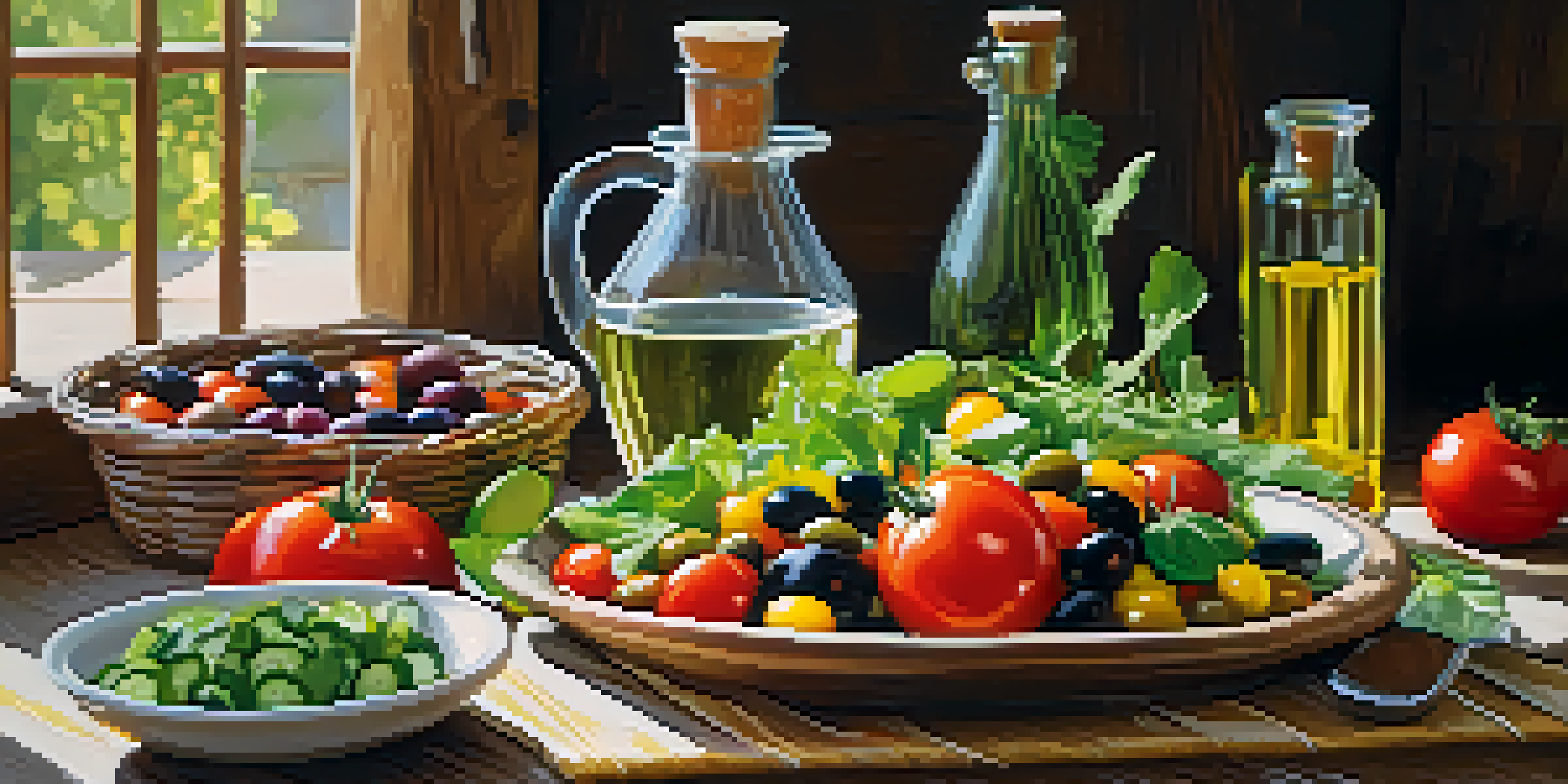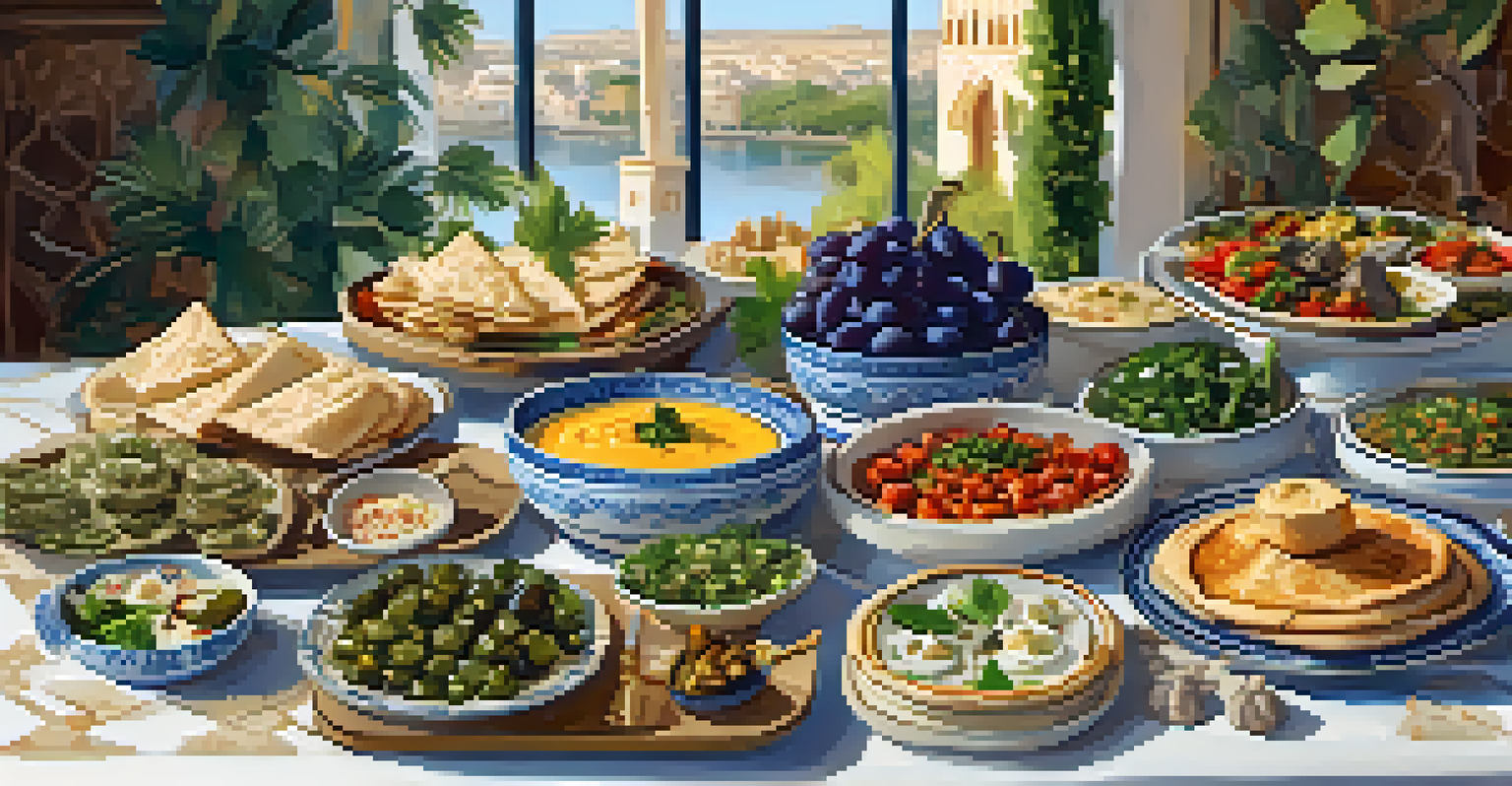Veganism in Mediterranean Cultures: A Culinary Journey

The Roots of Mediterranean Cuisine: A Plant-Based Foundation
Mediterranean cuisine is renowned for its fresh ingredients, and many dishes have plant-based roots. Staples like olives, tomatoes, and various legumes form the basis of countless meals. This foundation not only highlights the deliciousness of vegetables but also reflects the region's agricultural heritage.
The Mediterranean is a place where people eat together, celebrate together, and share their lives through food.
Historically, many Mediterranean cultures relied heavily on the land for sustenance. As such, they developed a rich array of recipes that celebrated seasonal produce. These culinary traditions often emphasize the importance of local ingredients, making it easier to embrace a vegan lifestyle.
This plant-centric approach makes Mediterranean cuisine naturally compatible with veganism. Whether it’s a vibrant ratatouille from France or a hearty chickpea stew from Greece, the emphasis on vegetables and grains allows for a delightful and diverse vegan experience.
Key Ingredients: The Stars of Mediterranean Vegan Dishes
When we think of Mediterranean vegan cuisine, certain ingredients come to mind. Staples like chickpeas, lentils, and eggplants are not only nutritious but also incredibly versatile. These ingredients form the backbone of many beloved dishes, making them essential for anyone exploring this culinary journey.

Herbs and spices play a crucial role in enhancing flavors, with basil, oregano, and garlic often taking center stage. These not only add depth to dishes but also celebrate the region's rich agricultural diversity. A dash of these can transform simple vegetables into extraordinary meals.
Plant-Based Roots of Mediterranean Cuisine
Mediterranean cuisine celebrates fresh, plant-based ingredients, making it a natural fit for vegan diets.
Additionally, healthy fats from olives and nuts provide a satisfying richness that complements plant-based dishes. The harmonious blend of these ingredients creates a delightful tapestry of flavors, showcasing how veganism can be both nourishing and indulgent.
Cultural Influences: How History Shapes Vegan Traditions
The Mediterranean region boasts a complex history, with various cultures influencing one another over centuries. Ancient Greek and Roman diets, for instance, heavily featured plant-based foods, laying the groundwork for modern vegan practices. Understanding these influences helps us appreciate the depth of Mediterranean vegan cuisine.
Let food be thy medicine and medicine be thy food.
Religious practices also play a significant role. Many Mediterranean cultures incorporate fasting periods where plant-based meals are the norm, promoting a diet rich in fruits and vegetables. This connection between spirituality and diet underscores how deeply ingrained veganism is in these cultures.
Moreover, the rise of the health-conscious movement has further propelled the popularity of veganism in the Mediterranean. As more people seek to connect with their roots while prioritizing health, traditional vegan recipes are being revitalized and celebrated.
Iconic Vegan Dishes: Must-Try Recipes from the Region
When it comes to iconic vegan dishes, the Mediterranean has plenty to offer. Take the classic Mediterranean salad, bursting with fresh tomatoes, cucumbers, and olives, all drizzled with olive oil and lemon. This simple yet flavorful dish epitomizes the essence of the region's culinary philosophy.
Another beloved dish is falafel, which has origins in the Levant. Made from ground chickpeas and spices, these crispy delights are enjoyed throughout the Mediterranean. Paired with tahini sauce and fresh veggies, falafel makes for a hearty and satisfying meal.
Cultural Heritage Influences Veganism
The region's complex history and cultural practices have deeply integrated plant-based eating into Mediterranean traditions.
Lastly, consider the rich flavors of ratatouille from France, a dish that celebrates seasonal vegetables. This colorful medley not only showcases the abundance of produce but also highlights how vegan cooking can be both comforting and vibrant.
Sustainable Practices: The Environmental Impact of Veganism
Veganism aligns beautifully with sustainable practices, especially in the Mediterranean context. Many countries in the region prioritize locally sourced ingredients, reducing the carbon footprint associated with food production. This focus on sustainability makes veganism an appealing choice for environmentally conscious eaters.
Additionally, the Mediterranean diet is inherently lower in processed foods, further supporting sustainability. By emphasizing fresh, whole ingredients, this culinary approach promotes a healthier planet and encourages a more mindful consumption of resources.
As more people adopt veganism for its environmental benefits, Mediterranean cultures are leading the way. By embracing plant-based diets, these communities are not only preserving their culinary heritage but also contributing to a more sustainable future.
Modern Adaptations: Veganism in Contemporary Mediterranean Cuisine
As veganism gains popularity worldwide, modern Mediterranean chefs are creatively adapting traditional recipes. These culinary innovators are reinterpreting classic dishes to suit contemporary palates, often experimenting with new ingredients and techniques. This evolution keeps the cuisine fresh and exciting.
For example, plant-based versions of traditional favorites like moussaka or paella are becoming increasingly common. Chefs are replacing meat with hearty vegetables and legumes, proving that you can enjoy the essence of these dishes without compromising on flavor or tradition.
Community Focus in Vegan Dining
Sharing vibrant vegan meals fosters connection and community, emphasizing the social aspect of Mediterranean dining.
This fusion of old and new not only preserves cultural heritage but also attracts a broader audience. By showcasing the versatility of Mediterranean cuisine, these adaptations encourage more people to explore veganism.
The Community Aspect: Sharing Vegan Meals in Mediterranean Cultures
In Mediterranean cultures, food is often about community and connection. Sharing meals with family and friends is a cherished tradition, and this extends to vegan dishes as well. The communal aspect of dining fosters a sense of belonging and strengthens relationships.
Vegan meals, with their vibrant colors and array of flavors, are perfect for sharing. Dishes like mezze platters, featuring an assortment of dips, salads, and breads, invite guests to sample and enjoy together. This style of eating emphasizes the joy of food and the importance of togetherness.

Moreover, as more people embrace veganism, community events centered around plant-based cooking are becoming popular. These gatherings not only promote the joys of vegan cuisine but also create supportive spaces for like-minded individuals to connect and share their experiences.
Conclusion: Embracing Veganism in the Mediterranean Way
Veganism in Mediterranean cultures offers a rich tapestry of flavors, traditions, and sustainable practices. This culinary journey celebrates the beauty of plant-based ingredients while honoring the region's deep-rooted history. Whether you’re a lifelong vegan or simply curious about adopting a plant-based lifestyle, there’s much to explore.
The vibrant dishes and communal spirit of Mediterranean dining make it an inviting option for anyone interested in veganism. By embracing this way of eating, you not only nourish your body but also connect with a rich cultural heritage.
Ultimately, the Mediterranean approach to veganism is about balance, sustainability, and joy. So, whether you’re enjoying a simple salad or a hearty stew, remember that each meal is an opportunity to celebrate life’s flavors and connections.